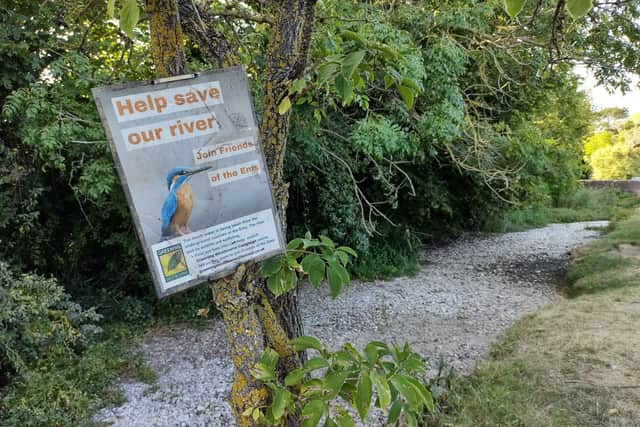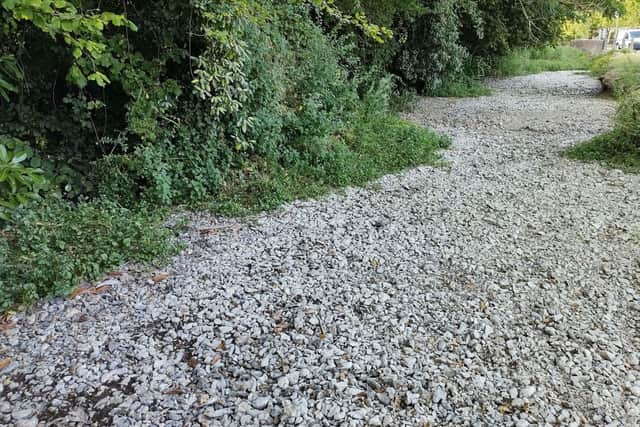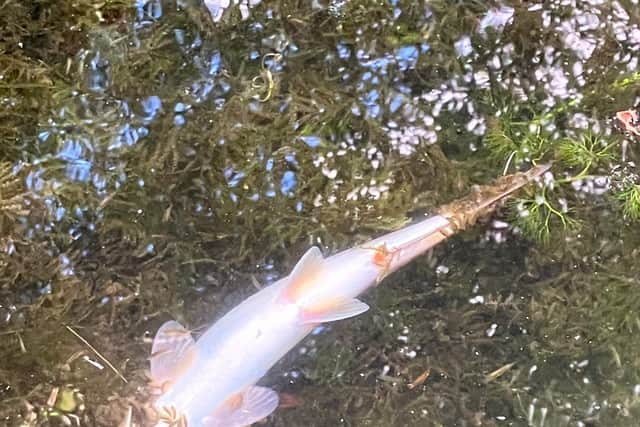River Ems crisis: Westbourne villagers plead with Portsmouth Water to introduce a hosepipe ban
and live on Freeview channel 276
The company takes what Westbourne villagers have described as ‘huge amounts of water’ from the underground sources of the River Ems, a chalk stream and wildlife haven that runs from the South Downs into Chichester Harbour.
Even before the current drought, flow in the Ems was low. Now the river is in crisis.
Advertisement
Hide AdAdvertisement
Hide AdThe plight of the river, with dying fish and whole sections completely dry, has prompted Westbourne Parish Council and environmental group, Greening Westbourne, to demand a hosepipe ban. It comes after a drought was officially declared on Friday (August 12).


The Ems flows through Westbourne, on the West Sussex and Hampshire border, before reaching Emsworth and the sea.
In a letter to Bob Taylor, chief executive officer of Portsmouth Water, Greening Westbourne chair Richard Hitchcock says: “The river has dried up completely in sections and residents have been hard at work attempting to save the fish that have not already perished. It is surely not too much to ask that a hosepipe ban be imposed immediately in Westbourne and surrounding parishes.”
A campaign group, Friends of the Ems, which is part of Greening Westbourne, has been in talks with Portsmouth Water and the Environment Agency for two years in an effort to reduce the amount taken – or ‘abstracted’ – from the river’s sources, and to improve flows.
Advertisement
Hide AdAdvertisement
Hide AdPortsmouth Water is obliged to pump some water back into the river at times of low flow, but Friends of the Ems wants this process improved.


In the letter, Mr Hitchcock adds: “Friends of the Ems had very much hoped that abstraction would be monitored closely and even reduced in order to restore the river to its original health. This would seem to be a somewhat time-consuming process and appears not to have been effected soon enough to protect the river in a time of very great heat and, even more importantly, no significant rainfall.”
Westbourne Parish Council has written to Mr Taylor on similar lines, echoing the plea on behalf of residents.
Chalk streams are known as ‘England’s rainforests’ because they are among the planet’s rarest habitats. There are only about 200 chalk streams in the world, and most of them are in the southern half of England.
Advertisement
Hide AdAdvertisement
Hide AdThe Ems is home to rare species including water voles and eels, and kingfishers, brown trout and many species of bat are regularly spotted.


A spokeswoman at Portsmouth Water said: ‘Temporary usage bans (hosepipe bans) can only legally be implemented if water companies reach stage two of their drought plans. These plans are agreed with the Secretary of State.
‘We have been consulting Department for Environment Food and Rural Affairs (DEFRA) and the Environment Agency regularly about the status of our water resources.
‘They have confirmed our ground water levels are sufficient for us to remain within stage one of our drought plan.
Advertisement
Hide AdAdvertisement
Hide Ad‘We therefore have no legal powers to issue further restrictions at this point.
‘We do not anticipate reaching stage two of the plan where we have to introduce restrictions unless the dry weather continues significantly into Autumn/Winter.
‘However, this does not mean we have water to spare. The weather has been unseasonably hot and dry in 2022, with no significant rain currently featuring in the long-range forecast.
‘So, whist we don’t expect the need for a formal hosepipe ban to be put in place, we do need to continue to ensure we use water wisely as a business – and we continue to urge our customers to do the same.
Advertisement
Hide AdAdvertisement
Hide Ad‘Portsmouth Water is continuing to take significant measures to protect and enhance the River Ems.
‘We have taken one of our pumping stations out of public water supply and are now using it solely to supplement the River Ems.
‘This results in more than two million litres of water a day pumped into the river once a trigger flow (the flow drops to a certain level) is reached – this is happening at the moment.
‘Due to the geology of the river bed, the location where we pump this water has an impact on how well it improves the flow.
Advertisement
Hide AdAdvertisement
Hide Ad‘We are working to make this supplementary flow as effective as possible by changing the discharge point into the river.
‘All of this work is carried out under licence from the Environment Agency and in collaboration with Friends of the Ems.
‘In the face of climate change and a growing population, we are creating longer terms plans to protect our environment whilst continuing to supply our customers with reliable, affordable, high-quality water.
‘Plans include the introduction of universal SMART metering to help manage demand and linking with the Havant Thicket Reservoir project to further support the River Ems.’
Advertisement
Hide AdAdvertisement
Hide AdTo find out more about Greening Westbourne and to join the Friends of the Ems, people can go to e-voice.org.uk/greening-westbourne
Greening Westbourne and the parish council are urging residents to save water.
Tips on doing this are promoted by Portsmouth Water here.
They include:
watering plants in the early morning or later in the evening
collecting rainwater in a water butt
letting lawns go brown – they will bounce back
cutting down on washing the car
avoiding letting taps run
collecting running water while you wait for it to heat up, and use it to water plants or flush the loo
making sure your washing machine has a full load
having a short shower rather than a bath